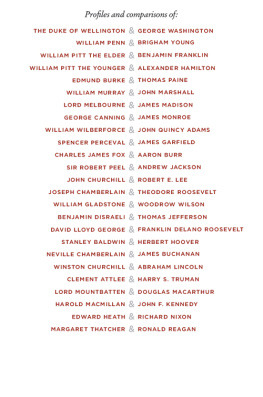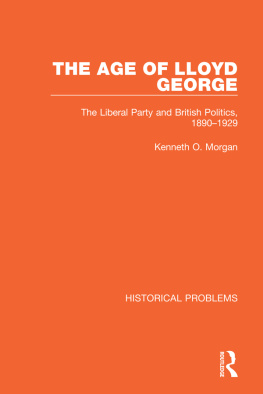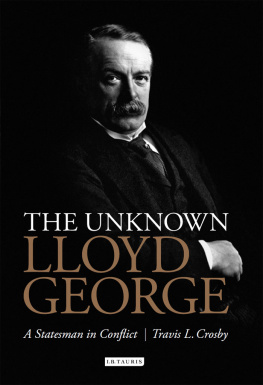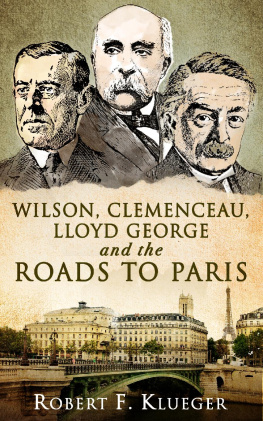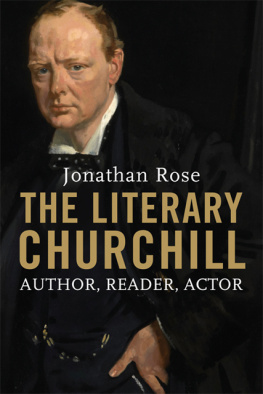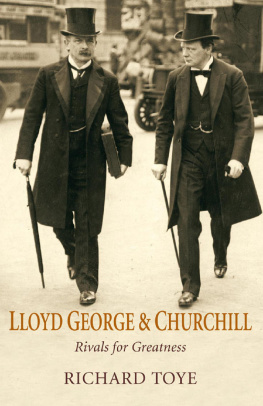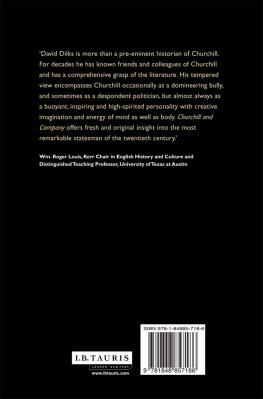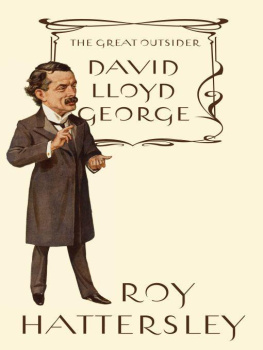This edition first published in the United States in 2008 by
The Overlook Press, Peter Mayer Publishers, Inc.
NEW YORK:
141 Wooster Street
New York, NY 10012
www.overlookpress.com
For bulk and special sales, contact sales@overlookny.com
Copyright 2005 by Robert Lloyd George
All rights reserved. No part of this publication may be reproduced or transmitted in any form or by any means, electronic or mechanical, including photocopy, recording, or any information storage and retrievalsystem now known or to be invented, without permission in writing from the publisher, except by a reviewer who wishes to quote brief passages in connection with a review written for inclusion in a magazine, newspaper, or broadcast.
ISBN 978-1-46830-599-9
For my Father
David Lloyd George aged 16, 1879
Highgate: David Lloyd Georges childhood home
Winston Churchill in the uniform of an officer of the 4th Hussars, 1895
Blenheim Palace, Churchills birthplace
The backbencher, David Lloyd George, 1903
Parliamentary candidate Winston Churchill, 1900
Meeting of Colonial Prime Ministers, 1907
David Lloyd George and Winston Churchill at an air show, 1911
Lloyd George and Churchill at the Royal National Eisteddfod in Llangollen, 1908
Winston Churchill and Clementine Hozier on their engagement, 1908
Churchills first day at the Admiralty, 1911
Budget Day, 1910
Lord Randolph Churchill, 1880
Herbert Henry Asquith as Chancellor of the Exchequer, 1905
First Sea Lord, Admiral John Fisher, 1905
Max Aitken, Lord Beaverbrook, 1930
The Lloyd Georges and the Churchills in Criccieth, 1910
Churchill, Lloyd George, the Asquiths and Sir Edward Grey in Scotland, 1913
on Criccieth golf course, 1910
Winston Churchill playing golf at Cannes, 1913
and 22. Cabinet notes passed between Lloyd George and Churchill, 1914
David Lloyd George and Clementine Churchill opening a munition workers canteen, 1916
Lloyd George giving a speech at Poynters End, 1916
Sir James Guthrie, Statesmen of World War One
David Lloyd George and A. J. Balfour leaving the Quai dOrsay, 1919
Lloyd George and Andrew Bonar Law at the Allied Conference, St Jamess Palace, 1921
Lloyd George, Churchill and Lord Birkenhead leaving Downing Street, 1922
David Lloyd George and Winston Churchill at the Printers Pension Fund Dinner, 1934
Lloyd George and Churchill in Cannes, 1938
David Lloyd George at home in Churt, 1942
Winston Churchill making a speech in the House of Commons, 1942
Churchill and Clement Atlee at Lloyd Georges Memorial Service, 1945
Picture credits: 1, 3, 4, 5, 6, 7, 10, 12, 13, 14, 15, 19, 20 and 28, Hulton Archive/Getty Images; 2, Gwynedd Archives; 9, The National Library of Wales; 11, 17, 18, 26, 27 and 30, Lloyd George Family Album; 16 and 25, National Portrait Gallery, London; 21, 22 and 31, House of Lords Record Office; 23 and 24, National Library of Wales; 29, Science and Society Picture Library; 32, Imperial War Museum; 33, Empics.
T HE LEGEND OF Winston Churchill is such a powerful one, and he has been so comprehensively written about, that it is very difficult to find a new angle on the great mans life. However, his friendship with David Lloyd George has never been fully covered in a single work and the argument of this book is that it constituted a vitally important influence on the young Churchill; and, indeed, he looked up to Lloyd George as a mentor throughout his life. Their friendship was unbroken for forty-four years, from the time of their first meeting in the House of Commons in February 1901 until Lloyd Georges death in March 1945. They had many quarrels and disagreements, but their affection for each other never wavered.
In this book I have tried to relate the personal as well as the political aspects of this fascinating story. In addition to exploring their relationship with each other, and with their families and friends, I have included meetings and conversations which took place away from the political world of Westminster to suggest how the close friendship between the two men may have influenced events of great historic importance for Britain and for the wider world: the Peoples Budget of 1909; the declaration of war in August 1914; the 1921 treaty giving independence to Ireland; the Balfour Declaration of 1917, pledging Britains support for a Jewish homeland in Palestine; the Norway debate in the House of Commons in May 1940, in which Lloyd George decisively intervened to bring down Neville Chamberlain and elevate Winston Churchill to the post of Prime Minister, at the moment of Britains greatest peril. In relating these historical events in detail, it is hoped that a new light may be cast on Churchill and the influence that Lloyd George had on his life.
I am indebted to my father, Owen, 3rd Earl Lloyd George of Dwyfor, for his advice and encouragement during the writing of this book and for the use of many family letters and photographs. My cousin William George, who is Lloyd Georges nephew, has taken many hours to correct, and comment on, my draft chapters and has given me valuable insight into his uncle from his own memory and experience. His daughter Anita gave helpful advice on quotations in Welsh. My cousin William, 3rd Viscount Tenby, was very helpful in researching the visitors book at the Lloyd George family home at Churt in Surrey. Sadly, I did not have the opportunity to talk to the late John Grigg about his brilliant biography of my great-grandfather, to which I also owe so much.
Among others, I would like to thank the National Library of Wales and in particular John Graham Jones, head of archives; the House of Lords Record Office where the other Lloyd George papers are deposited, and especially Miss Katherine Bligh; and Churchill College, Cambridge. Thanks are also due to Mary, Lady Soames, with whom I had a most illuminating conversation about her father, Winston Churchill, and her memories of Lloyd George. The staff at Chartwell, Churchills country house in Kent, have been helpful and supportive in enabling me to study the Chartwell visitors book, and I have also drawn valuable material from the National Archives of Scotland, Edinburgh (Lothian Papers), the Imperial War Museum archives (Sir Henry Wilsons diaries) and the British Library. My cousin, Robin Carey-Evans, who lives in Sydney, Australia, also gave me a lot of support and encouragement. Some early archival research was done by Catherine Field and the picture research by Rebecca Snow.
My cousin Dr Margaret Macmillan, author of Peacemakers (2002), has read some of the chapters and made useful comments, as has Professor Avi Shlaim of St Anthonys College, Oxford. My oldest friend, Philip Snow, has helped greatly with his advice and suggestions about the shape of the book. I have also consulted the Lloyd George family genealogist, Harry Harrison. Jennifer Longford and her daughter Ruth Longford were very helpful and provided me with some letters and photographs of Lloyd George. James Arbuthnot MP kindly introduced me to the House of Commons and elucidated the meaning of the Bar.
With thanks also to Hugo de Klee, Gillon Aitken, Roland Philipps, Kenneth Rose, Sir Martin Gilbert and Michael Meredith. I would especially like to thank my secretary, Kim Waterfield, who valiantly typed and retyped the many drafts of David & Winston. Finally, I would like to thank my beloved wife Donna and my children Ricky, Alice, Julia, Alexander, Nicholas, Robert, David, Sophia and Elizabeth, without whom I might have been able to finish the book a lot earlier, but whose love, support and encouragement has helped me to complete it.


